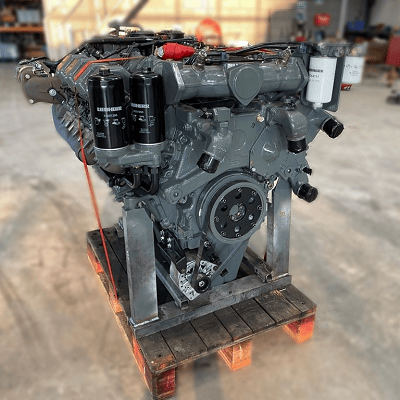When it comes to heavy machinery, reliability and power are paramount. Liebherr, a name synonymous with innovation and excellence in engineering, stands tall as a pioneer in the realm of heavy equipment and machinery. From towering cranes to robust excavators, Liebherr’s engineering prowess extends to the heart of these machines. We delve into the world of dyno testing a Liebherr engine, uncovering the meticulous process behind unleashing the raw power concealed within. Before we embark on the journey of dyno testing, it’s crucial to understand the foundation upon which Liebherr engines are built. With decades of engineering expertise and commitment to quality, Liebherr engines are crafted to withstand the most demanding environment and deliver unparalleled performance. Each component is meticulously designed and rigorously tested to ensure reliability, efficiency and longevity. 1 Preparation: The engine undergoes meticulous preparation before being mounted onto the dynamo meter. This includes ensuring all connections are secure, fluids are filled to the appropriate levels, and sensors are properly calibrated. 2 Mounting: The engine is carefully mounted onto the dynamometer, a specialized device designed to simulate real-world operating conditions. Precision is paramount during this step to ensure accurate results. 3 Initial checks: Once mounted, a series of initial checks are conducted to verify proper alignment, connection integrity, and functionality of all engine systems. 4 Warm-up: The engine is started and allowed to warm up to operating temperature. This ensures consistent results and minimizes the risk of damage during testing. 5 Baseline testing: With the engine warmed up , baseline tests are conducted to establish initial performance metrics. This includes measuring power output, torque, fuel consumption, and emissions at various RPM levels. 6 Load testing: The engine is subjected to progressively increasing loads to simulate different operating conditions, such as idle, partial load and full load. This allows engineers to assess performance across the entire operating range and identify any potential issues or optimization. 7 Data analysis: Throughout the testing process, data is continuously collected and analyzed in real-time. Advanced instrumentation and software are used to monitor performance metrics and identify trends or anomalies. 8 Optimazation: Based on the data analysis, adjustments may be made to optimize engine performance. This could involve fine-tuning fuel injection timing, adjusting air-fuel ratios, or optimize turbocharger boost pressure. 9 Validation: Once testing is complete, the results are meticulously reviewed and validated against predetermined criteria and specifications. Any deviations or anomalies are thoroughly investigated to ensure accuracy and reliability. 10 Reporting: Finally, a comprehensive report is generated detailing the results of the dyno testing, including performance metrics, observations, and any recommendations for further optimization or refinement. Dyno testing a Liebherr engine is more than just a routine procedure – it’s a testament to the unwavering commitment to excellence that defines Liebherr’s engineering philosophy. By subjecting their engines to rigorous testing and analysis, Liebherr ensures that each engine delivers the uncompromising performance, reliability, and efficiency that customers expect. In conclusion, dyno testing a Liebherr engine is not just about measuring power output. It’s about unlocking the true potential of these remarkable engines and ensuring they exceed expectations in the most challenging environments imaginable. A press brake is a piece of manufacturing equipment that is used to bend sheet metal. A press brake is typically narrow and long so that large pieces of sheet metal can be bent by it. A press brake bends sheet metal by lowering a punch onto sheet metal that has been positioned on top of a die. The metal may be bent several times by a press brake until the desired form has been achieved. Press Brake,Cnc Press Brake,Metal Bending Machine,Hydraulic Press Brake Jiangsu Hoston Machine Tools Co., Ltd. , https://www.haostonmachinetools.com
The process of a dyno test on a Liebherr engine

The foundation of excellence
The process
The outcome of dyno testing
Press brakes can make a variety of different bends on many different types of metals. When setting up a bending process, it is important to consider the metal type being bent, the die, the punch, and the bending force.
The metal type is important to understand because of the differing physical properties among metals. For instance, a high carbon steel will generally be less bendable by a press brake than many aluminum alloys because of the differences in ductility and strength. Metals typically have a recommended minimum bend radius that the material can be bent to without damaging it.
The die and the punch used on the press brake both have a large impact on the bending process. The die is hollow material that the metal is placed on top of prior to bending. It is a very hard and strong material that is near in shape to the desired shape of the metal being bent. The punch is a solid material that is lowered down onto the metal. Since the pressing action of the punch onto the metal and the die are what causes the metal to bend, both shapes must be accurately suited to the bending job. The correct metal shape following a press brake operation is dependent on the size and shape of the punches and dies. The dies and the punches are typically designed in such a way that they can be interchanged easily to accommodate a wide array of jobs.
December 08 21:59:47, 2024
window.authenticationPopup = {"autocomplete":"off","customerRegisterUrl":"https:\/\/www.cranepartssupply.com\/en\/customer\/account\/create\/","customerForgotPasswordUrl":"https:\/\/www.cranepartssupply.com\/en\/customer\/account\/forgotpassword\/","baseUrl":"https:\/\/www.cranepartssupply.com\/en\/","customerLoginUrl":"https:\/\/www.cranepartssupply.com\/en\/customer\/ajax\/login\/"}
{
"#authenticationPopup": {
"Magento_Ui/js/core/app": {"components":{"authenticationPopup":{"component":"Magento_Customer\/js\/view\/authentication-popup","children":{"messages":{"component":"Magento_Ui\/js\/view\/messages","displayArea":"messages"},"captcha":{"component":"Magento_Captcha\/js\/view\/checkout\/loginCaptcha","displayArea":"additional-login-form-fields","formId":"user_login","configSource":"checkout"}}}}} },
"*": {
"Magento_Ui/js/block-loader": "https\u003A\u002F\u002Fwww.cranepartssupply.com\u002Fstatic\u002Fversion1728988868\u002Ffrontend\u002FComaxx\u002FPartsSupply\u002Fen_US\u002Fimages\u002Floader\u002D1.gif"
}
}
{
"*": {
"Magento_Customer/js/section-config": {
"sections": {"stores\/store\/switch":["*"],"stores\/store\/switchrequest":["*"],"directory\/currency\/switch":["*"],"*":["messages"],"customer\/account\/logout":["*","recently_viewed_product","recently_compared_product","persistent"],"customer\/account\/loginpost":["*"],"customer\/account\/createpost":["*"],"customer\/account\/editpost":["*"],"customer\/ajax\/login":["checkout-data","cart","captcha"],"catalog\/product_compare\/add":["compare-products"],"catalog\/product_compare\/remove":["compare-products"],"catalog\/product_compare\/clear":["compare-products"],"sales\/guest\/reorder":["cart"],"sales\/order\/reorder":["cart"],"checkout\/cart\/add":["cart","directory-data"],"checkout\/cart\/delete":["cart"],"checkout\/cart\/updatepost":["cart"],"checkout\/cart\/updateitemoptions":["cart"],"checkout\/cart\/couponpost":["cart"],"checkout\/cart\/estimatepost":["cart"],"checkout\/cart\/estimateupdatepost":["cart"],"checkout\/onepage\/saveorder":["cart","checkout-data","last-ordered-items"],"checkout\/sidebar\/removeitem":["cart"],"checkout\/sidebar\/updateitemqty":["cart"],"rest\/*\/v1\/carts\/*\/payment-information":["cart","last-ordered-items","captcha","instant-purchase"],"rest\/*\/v1\/guest-carts\/*\/payment-information":["cart","captcha"],"rest\/*\/v1\/guest-carts\/*\/selected-payment-method":["cart","checkout-data"],"rest\/*\/v1\/carts\/*\/selected-payment-method":["cart","checkout-data","instant-purchase"],"customer\/address\/*":["instant-purchase"],"customer\/account\/*":["instant-purchase"],"vault\/cards\/deleteaction":["instant-purchase"],"persistent\/index\/unsetcookie":["persistent"],"review\/product\/post":["review"],"wishlist\/index\/add":["wishlist"],"wishlist\/index\/remove":["wishlist"],"wishlist\/index\/updateitemoptions":["wishlist"],"wishlist\/index\/update":["wishlist"],"wishlist\/index\/cart":["wishlist","cart"],"wishlist\/index\/fromcart":["wishlist","cart"],"wishlist\/index\/allcart":["wishlist","cart"],"wishlist\/shared\/allcart":["wishlist","cart"],"wishlist\/shared\/cart":["cart"],"catalog\/customproduct\/add":["cart"],"braintree\/paypal\/placeorder":["cart","checkout-data"],"braintree\/googlepay\/placeorder":["cart","checkout-data"]},
"clientSideSections": ["checkout-data","cart-data"],
"baseUrls": ["https:\/\/www.cranepartssupply.com\/en\/"],
"sectionNames": ["messages","customer","compare-products","last-ordered-items","cart","directory-data","captcha","instant-purchase","loggedAsCustomer","persistent","review","wishlist","recently_viewed_product","recently_compared_product","product_data_storage"] }
}
}
{
"*": {
"Magento_Customer/js/customer-data": {
"sectionLoadUrl": "https\u003A\u002F\u002Fwww.cranepartssupply.com\u002Fen\u002Fcustomer\u002Fsection\u002Fload\u002F",
"expirableSectionLifetime": 61,
"expirableSectionNames": ["cart","persistent"],
"cookieLifeTime": "3600",
"updateSessionUrl": "https\u003A\u002F\u002Fwww.cranepartssupply.com\u002Fen\u002Fcustomer\u002Faccount\u002FupdateSession\u002F"
}
}
}
{
"*": {
"Magento_Customer/js/invalidation-processor": {
"invalidationRules": {
"website-rule": {
"Magento_Customer/js/invalidation-rules/website-rule": {
"scopeConfig": {
"websiteId": "1"
}
}
}
}
}
}
}
{
"body": {
"pageCache": {"url":"https:\/\/www.cranepartssupply.com\/en\/page_cache\/block\/render\/page_id\/268\/","handles":["default","cms_page_view","cms_page_view_id_the-process-of-a-dyno-test-on-a-liebherr-engine"],"originalRequest":{"route":"cms","controller":"page","action":"view","uri":"\/en\/the-process-of-a-dyno-test-on-a-liebherr-engine"},"versionCookieName":"private_content_version"} }
}